I have always been a fan of fruit smoothies. They are refreshing, delicious, and packed with essential vitamins and minerals. But as I delved deeper into the world of nutrition, I began to wonder – do fruit smoothies make you gain weight?
It turns out that fruit smoothies can potentially lead to weight gain if not consumed mindfully. While they have numerous health benefits, there are several factors to consider when incorporating them into your diet.
Key Takeaways:
- Consuming large portions of fruit smoothies can contribute to weight gain.
- Ingredients like yogurt, sweeteners, and ice cream can increase the calorie content of smoothies.
- Store-bought smoothies often contain high amounts of added sugar, which can lead to weight gain.
- Drinking smoothies quickly can cause blood sugar spikes and increased hunger.
- Timing and protein/fiber content play a role in the impact of smoothies on weight.
Smoothie Size Matters
A common mistake with fruit smoothies is consuming too large of a portion. Smoothies can be deceivingly high in calories, carbohydrates, and sugar, especially when made with large amounts of fruit and additional ingredients like granola or whipped cream. It’s important to exercise portion control for smoothies to maintain a healthy balance in your diet.
Limiting the size of your smoothie can help control your calorie intake. I recommend keeping your smoothie portion size to 8-10 ounces. This allows you to enjoy the deliciousness of a smoothie while managing your calorie consumption.
In addition to being mindful of the overall size of your smoothie, it’s also essential to pay attention to the calorie content. A larger smoothie not only contains more calories but can also contribute to feelings of bloating and discomfort.
To help you visualize the potential calorie content of different smoothie sizes, check out the table below:
| Smoothie Size | Approximate Calorie Content |
|---|---|
| 8-10 ounces | 150-200 calories |
| 16-20 ounces | 300-400 calories |
| 24-32 ounces | 450-600 calories |
As you can see, the larger the smoothie, the higher the calorie content. By sticking to a smaller portion size, you can enjoy the nutritional benefits of a smoothie without compromising your calorie goals.
Remember, moderation is key when it comes to incorporating smoothies into your diet. Be mindful of the portion size and the ingredients you choose, and your smoothies can be a healthy and delicious addition to your daily routine.
Ingredient Overload
When it comes to fruit smoothies, the ingredients you choose can have a significant impact on the calorie content. An ingredient overload can quickly turn your healthy smoothie into a high-calorie treat. It’s essential to be mindful of the ingredients you add to your smoothies to avoid potential weight gain.
Some high-calorie smoothie ingredients to watch out for include:
- Yogurt: While yogurt can add creaminess and tanginess to your smoothie, it can also contribute to the overall calorie content. Opt for low-fat or Greek yogurt to reduce the calorie load.
- Sweeteners: Adding sweeteners like honey, agave syrup, or flavored syrups can significantly increase the sugar and calorie content of your smoothie. Instead, try using natural sweeteners like stevia or a small amount of fruit.
- Ice cream: While it may be tempting to add a scoop of ice cream for a creamy and indulgent smoothie, it can add unnecessary calories. Consider using frozen bananas or avocados for creaminess instead.
To help you make healthier choices, here’s a table highlighting the approximate calorie content of common smoothie add-ins:
| Smoothie Add-Ins | Calories per Serving |
|---|---|
| Yogurt (1/2 cup) | 55-80 |
| Honey (1 tablespoon) | 64 |
| Agave Syrup (1 tablespoon) | 60 |
| Flavored Syrups (1 tablespoon) | 40-60 |
| Ice Cream (1 scoop) | 137-207 |
Choosing lower-calorie options and being mindful of portion sizes can help you create a healthier smoothie without compromising on taste. Remember, a balance of flavors and ingredients is key to enjoying a satisfying, yet nutritious smoothie.
The Sugar Trap
When it comes to fruit smoothies, the sugar content can be a real concern. Many store-bought options are loaded with added sugars, which can contribute to weight gain. Excessive sugar intake not only adds extra calories but can also lead to energy crashes and increased hunger.
To avoid falling into the sugar trap, it is important to make mindful choices when selecting or preparing fruit smoothies. One strategy is to choose smoothies that contain more vegetables than fruits. Vegetables add nutritional value and help balance the sugar content.
Additionally, opting for low-sugar fruits can help reduce the overall sugar content in your smoothie. Some examples of low-sugar fruits include berries, citrus fruits, and melons. These fruits give you the sweetness you crave without the excess sugar.
Avoiding additional sweeteners is another way to limit the sugar content in your smoothie. Many smoothie recipes call for honey, agave syrup, or other sweeteners, but these can quickly add up in terms of sugar content. Instead, rely on the natural sweetness of the fruits and vegetables or use alternatives like stevia or monk fruit.
Let’s take a look at a comparison of common ingredients and their sugar content:
| Ingredient | Sugar Content (per 100g) |
|---|---|
| Banana | 17g |
| Strawberries | 4.9g |
| Pineapple | 9.9g |
| Kale | 0.9g |
| Mango | 14g |
By being mindful of the sugar content in your smoothies, you can enjoy them without worrying about their impact on your weight. Balance, moderation, and making smart ingredient choices are key to creating healthier, low-sugar smoothies.
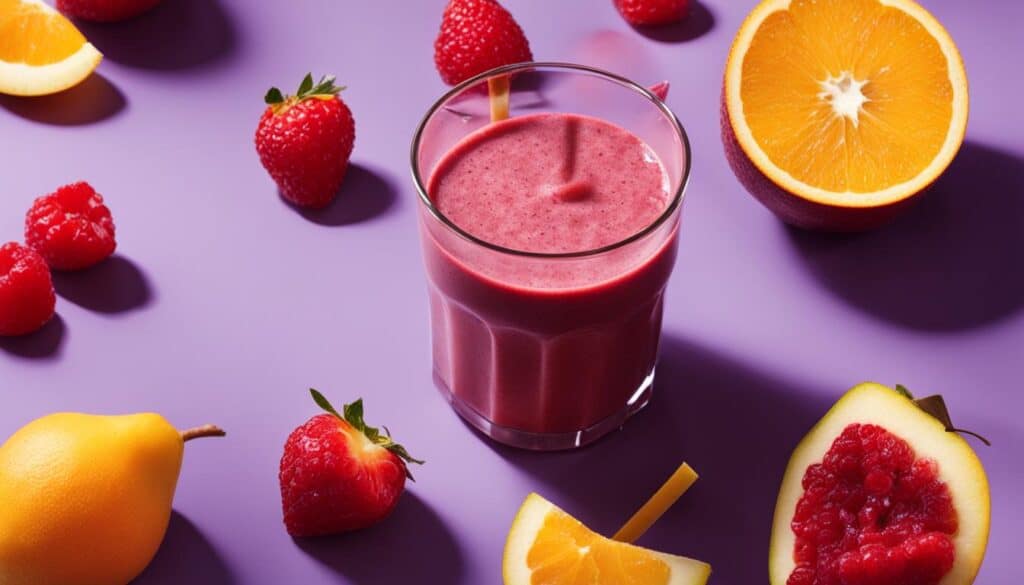
Speedy Consumption
When it comes to enjoying a fruit smoothie, the speed at which you consume it can have an impact on your body’s response. Drinking a smoothie too quickly can lead to a sudden spike in blood sugar levels, which can then result in a crash and increased feelings of hunger.
Mindful eating is key
To avoid this roller coaster effect, it’s important to practice mindful eating and slow down your consumption. Instead of sipping your smoothie through a straw, try using a spoon to eat it, which naturally slows down the process. This allows your body to better recognize and register the food, leading to a greater sense of satiety.
“By taking the time to eat your smoothie with a spoon, you give your brain and body the chance to fully experience the flavors and textures, leading to a more satisfying and enjoyable eating experience.”
Furthermore, adding protein and healthy fats to your smoothie can also help increase feelings of fullness and prevent overeating. Protein takes longer to digest than sugar, and healthy fats provide a lasting source of energy, both of which contribute to a longer-lasting feeling of satiety.
By incorporating these mindful eating techniques and adding protein and healthy fats to your smoothie, you can enjoy a more satisfying and balanced experience, while also preventing potential weight gain.
Timing Matters
The timing of consuming a smoothie can have a significant impact on its effects on weight. Smoothies, being in liquid form, are easier to digest compared to solid food. This makes them an ideal choice as a post-workout beverage or even as a meal replacement.
When consumed after a workout, a smoothie can provide your body with essential nutrients and help replenish glycogen stores. It can also aid in muscle recovery and prevent post-workout fatigue. The timing of a post-workout smoothie is crucial, as it allows your body to efficiently absorb the sugar and nutrients, promoting quicker recovery and better overall performance.
Additionally, incorporating a smoothie as a meal replacement can be beneficial for weight management. By replacing a regular meal with a smoothie, you can control your calorie intake while still satisfying your hunger. However, it is essential to ensure that the smoothie is nutritionally balanced and contains an adequate amount of protein, fiber, healthy fats, and carbohydrates.
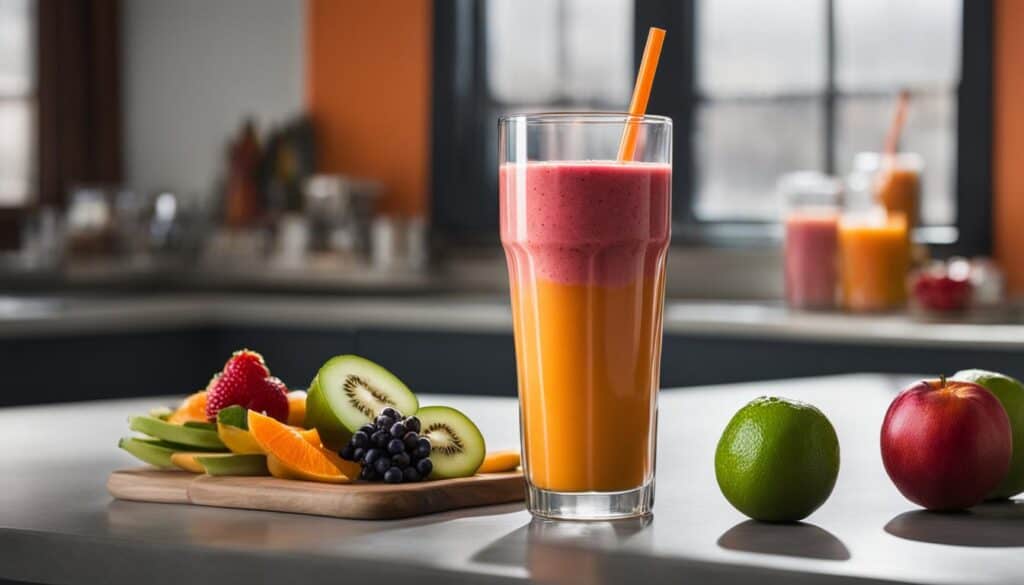
Overall, timing your smoothie consumption strategically can optimize its effects on weight. Consider incorporating a smoothie as a post-workout beverage to aid in recovery or as a meal replacement to manage calorie intake effectively. Just remember to make your smoothies nutritionally balanced and include a variety of fruits, vegetables, protein, and healthy fats for a well-rounded meal or snack.
Lack of Protein
A common mistake in smoothie preparation is not including enough protein. Protein plays a crucial role in our diet and can have various health benefits. When it comes to smoothies, protein helps build lean muscle, promotes satiety, and supports weight loss. By adding protein sources to your smoothie, you can enhance its nutritional value and make it a more well-rounded meal.
There are several great options for adding protein to your smoothies. Here are a few ideas:
- Milk: Both dairy and plant-based milk, such as almond or soy milk, can provide a good amount of protein to your smoothie. Choose a variety that suits your dietary preferences and needs.
- Greek Yogurt: Greek yogurt is an excellent source of protein and adds a creamy texture to your smoothie. It also provides probiotics, which support a healthy gut.
- Chia Seeds: These tiny seeds are packed with protein, fiber, and omega-3 fatty acids. They can be added to your smoothie to boost its protein content and add some extra crunch.
- Protein Powder: There are many types of protein powders available, including whey, soy, and pea protein. Choose a high-quality powder that aligns with your dietary goals and taste preferences.
Remember to adjust the amount of protein based on your individual needs and dietary restrictions. Some people may require more protein than others, especially if they are active or have specific health conditions.
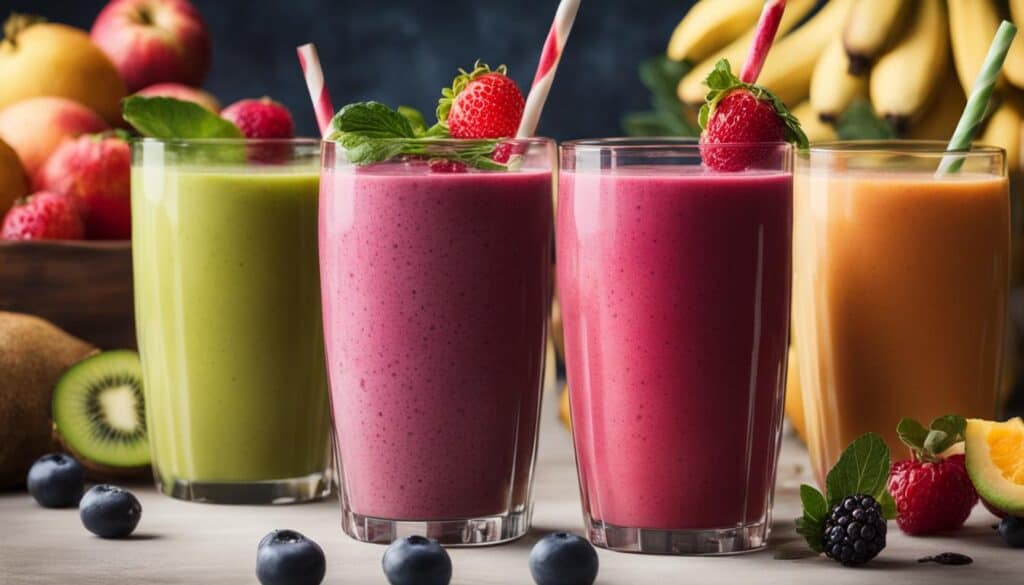
Adding protein to your smoothie can help create a well-balanced meal that keeps you satisfied for longer. It can also support your weight loss goals by preventing excessive snacking or overeating later in the day.
Skimping on Fiber
When it comes to creating a nutritious smoothie, one vital component often goes overlooked – fiber. Incorporating fiber-rich ingredients into your smoothies is essential for maintaining a sense of fullness and promoting good digestive health. Unfortunately, many smoothie recipes lack these fiber powerhouses, putting you at risk of increased hunger and potential overeating later in the day.
To prevent weight gain and ensure a well-rounded smoothie, it’s crucial to include fiber-rich foods in your blends. Some excellent options for adding fiber to your smoothies include berries, kale, avocado, and chia seeds. These ingredients not only provide a healthy dose of fiber but also offer a range of other nutritional benefits.
The Benefits of Fiber in Smoothies
Fiber plays a vital role in your overall well-being. Let’s take a look at some key benefits of including fiber in your smoothies:
- Promotes Digestive Health: Fiber helps to regulate bowel movements and prevent constipation. It adds bulk to your stools, making them easier to pass, which in turn aids in maintaining a healthy digestive system.
- Increases Satiety: High-fiber foods take longer to digest, helping you feel fuller for longer periods. Including fiber in your smoothies can assist in controlling your appetite and reducing the likelihood of overeating throughout the day.
- Manages Blood Sugar Levels: Fiber slows down the absorption of sugar into the bloodstream, preventing spikes and crashes in blood sugar levels. This can be particularly beneficial for individuals with diabetes or those looking to maintain stable energy levels.
- Supports Weight Management: The combination of increased fullness and better blood sugar control makes fiber a valuable tool for weight management. By incorporating fiber-rich foods into your smoothies, you can help prevent weight gain and promote healthy weight loss.
An Example: Fiber-Rich Smoothie Recipe
Here’s an example of a delicious and fiber-packed smoothie recipe to get you started:
| Ingredients | Nutritional Information |
|---|---|
| 1 cup spinach | Fiber: 2g |
| ½ medium banana | Fiber: 1.4g |
| ½ cup mixed berries | Fiber: 3.5g |
| 1 tablespoon chia seeds | Fiber: 5.5g |
| 1 cup almond milk | Fiber: 1g |
This fiber-rich smoothie combines the goodness of spinach, banana, mixed berries, chia seeds, and almond milk. Not only does it provide a substantial amount of fiber, but it also delivers a wide range of vitamins, minerals, and antioxidants.
Remember, getting enough fiber is essential for your overall health and well-being. Don’t skimp on this crucial nutrient when it comes to creating your smoothies!
Excessive Fruit Consumption
While fruits are nutritious and high in fiber, it’s important to be mindful of excessive fruit intake in smoothies to prevent weight gain. Although fruits contain natural sugars, consuming too much can lead to hunger pangs and potential overeating. To maintain a balanced calorie intake, it’s crucial to strike a balance by incorporating protein sources such as milk, yogurt, or nut butter into your smoothie recipe.
By combining the natural sweetness of fruits with protein, you can create a satisfying and nourishing smoothie that can help control your calorie intake. Adding protein to your smoothie not only enhances its taste but also promotes satiety, preventing you from consuming excess calories throughout the day.
To illustrate this point, here’s an example of a balanced smoothie recipe:
| Ingredients | Calories |
|---|---|
| 1 medium banana | 105 |
| 1 cup frozen berries (strawberries, blueberries, raspberries) | 70 |
| 1 scoop vanilla protein powder | 120 |
| 1 cup unsweetened almond milk | 30 |
| 1 tablespoon almond butter | 100 |
Total Calories: 425
This smoothie provides a well-rounded combination of fruits, protein, and healthy fats. It delivers essential nutrients while keeping the calorie count in check.
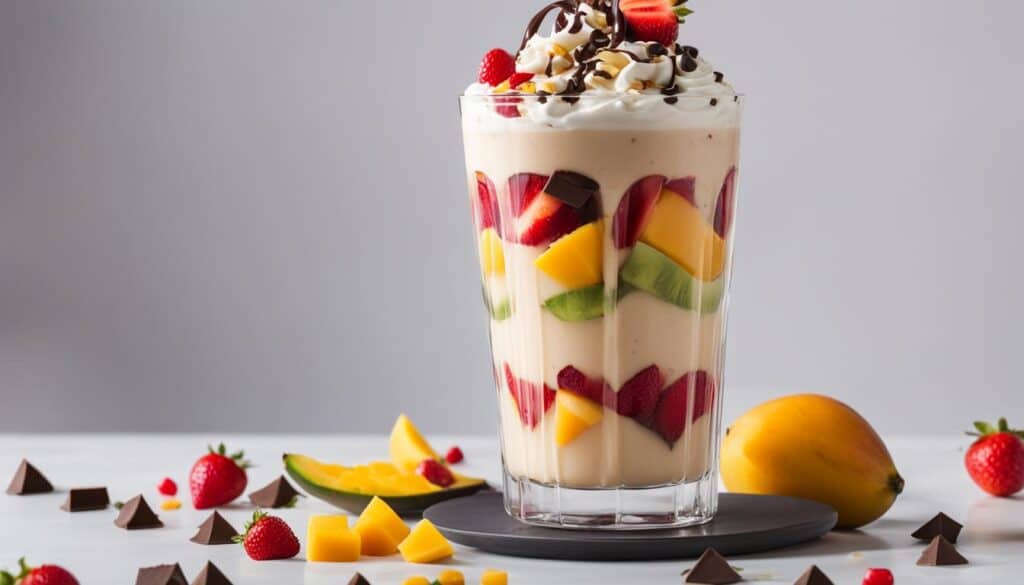
The Role of Protein in Smoothies
Protein is a vital macronutrient that plays a crucial role in weight management. It helps build and repair tissues, supports muscle growth, and promotes satiety. Incorporating protein into your smoothies not only helps balance the calorie content but also provides sustained energy throughout the day.
In addition to protein, it’s important to consider other aspects of your smoothie, such as fiber content and overall nutritional balance. A holistic approach to smoothie preparation ensures that you’re nourishing your body while maintaining a healthy weight.
Conclusion
After considering the potential impact of fruit smoothies on weight, it is clear that mindful preparation and consumption is crucial. While smoothies can contribute to weight gain if not properly managed, they can also be a nutritious and satisfying addition to a balanced diet.
To ensure that fruit smoothies support a healthy lifestyle, here are some key tips to keep in mind:
1. Control portion sizes: Limit the size of your smoothie to 8-10 ounces to manage calorie intake effectively.
2. Choose low-calorie ingredients: Be mindful of the ingredients you use, opting for lower-calorie options and avoiding excessive amounts of high-calorie additions like yogurt or sweeteners.
3. Limit added sugars: Select smoothies with more vegetables than fruits and minimize the overall sugar content by using low-sugar fruits and avoiding additional sweeteners.
4. Balance fruit intake: While fruits are nutritious, ensure that your smoothie includes protein and fiber sources to prevent excessive calorie consumption and manage hunger levels.
By incorporating these tips into your smoothie-making routine, you can enjoy the benefits of fruit smoothies while supporting your weight management goals and overall well-being.
FAQ
Can fruit smoothies make you gain weight?
Fruit smoothies can potentially lead to weight gain if not consumed mindfully. Factors such as portion size, ingredients, added sugars, consumption speed, timing, protein and fiber content, and excessive fruit intake can all contribute to weight gain.
Do fruit smoothies make you gain belly fat?
Like any food, consuming fruit smoothies in excessive amounts can contribute to weight gain, including belly fat. However, by controlling portion sizes, choosing low-calorie ingredients, and balancing fruit intake with protein and fiber sources, you can enjoy fruit smoothies as part of a healthy diet.
Do fruit smoothies cause weight gain?
Fruit smoothies can potentially cause weight gain if consumed in excessive amounts or made with high-calorie ingredients. It is important to be mindful of portion sizes, ingredient choices, and overall calorie intake when including fruit smoothies in your diet.
Can smoothies make you gain weight?
Yes, smoothies can contribute to weight gain if they are high in calories, sugars, and consumed in large quantities. It is important to create balanced smoothies that include a variety of nutrient-dense ingredients and control portion sizes to prevent excessive calorie intake.
Do fruit smoothies make you put on weight?
Fruit smoothies can potentially lead to weight gain if consumed mindlessly or made with high-calorie ingredients. By making mindful choices in terms of portion sizes, ingredients, and overall calorie intake, you can incorporate fruit smoothies as part of a healthy, balanced diet.
Can fruit smoothies contribute to weight gain?
Yes, fruit smoothies can contribute to weight gain if they are high in calories, sugars, and consumed excessively. It is important to be aware of portion sizes, ingredient choices, and overall calorie intake when including fruit smoothies in your diet.
What is the truth about fruit smoothies and weight gain?
Fruit smoothies can potentially lead to weight gain if not prepared and consumed mindfully. Factors such as portion sizes, ingredient choices, added sugars, consumption speed, timing, protein and fiber content, and excessive fruit intake can all impact their effects on weight. By making informed choices and creating balanced smoothies, you can enjoy fruit smoothies as part of a healthy diet without promoting weight gain.
Do fruit smoothies contribute to weight gain?
Yes, fruit smoothies can contribute to weight gain if they are high in calories and consumed excessively. It is important to control portion sizes, choose low-calorie ingredients, limit added sugars, and balance fruit intake with protein and fiber sources to prevent weight gain.
Can fruit smoothies make you gain weight?
Fruit smoothies can potentially lead to weight gain if consumed in excessive amounts or made with high-calorie ingredients. It is important to be mindful of portion sizes, ingredient choices, and overall calorie intake when including fruit smoothies in your diet.
Are fruit smoothies fattening?
Fruit smoothies can be high in calories if they are made with large amounts of fruit, added sugars, or high-calorie ingredients. However, by controlling portion sizes, choosing low-calorie ingredients, and balancing fruit intake with protein and fiber sources, you can enjoy fruit smoothies as part of a healthy diet without promoting weight gain.

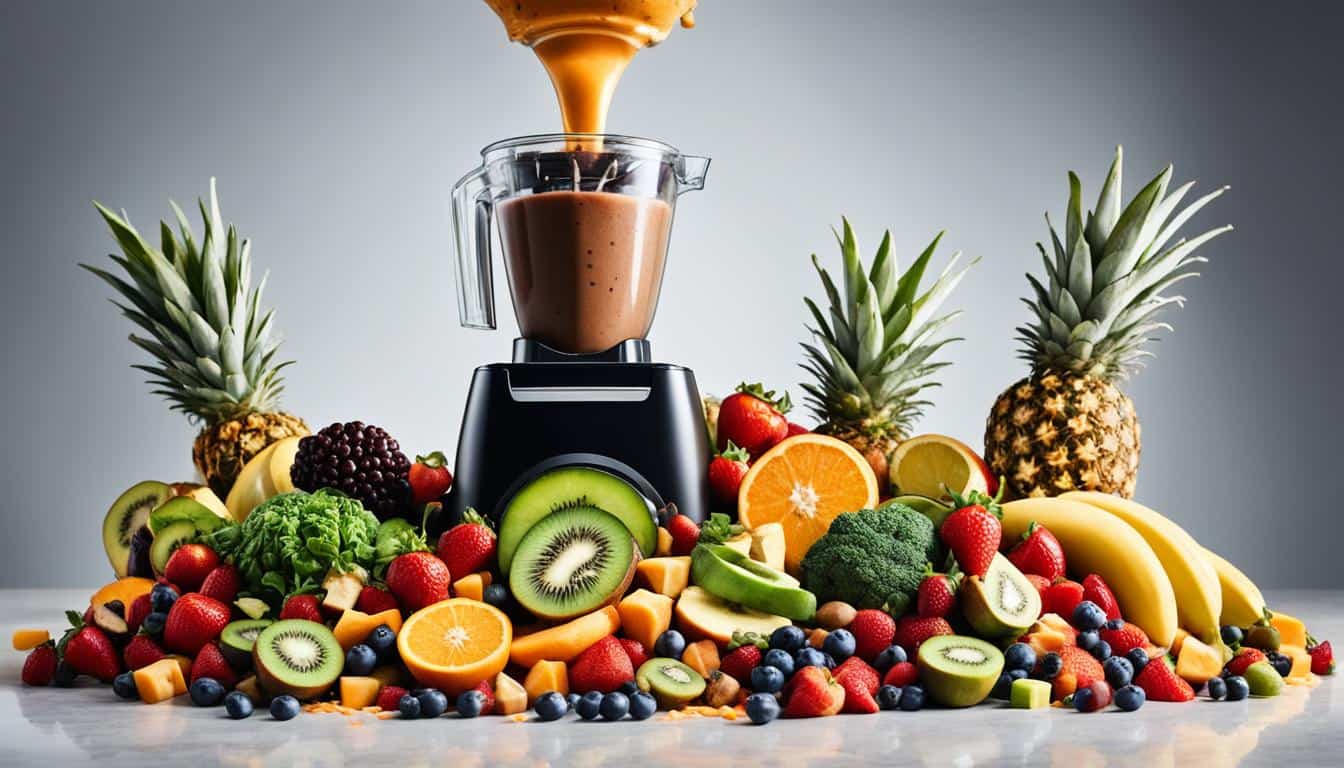



Leave a Reply